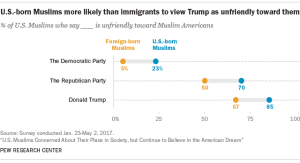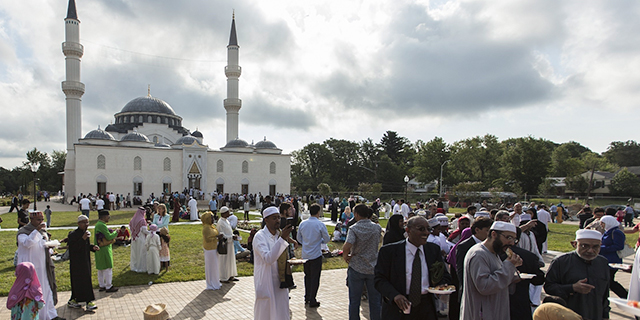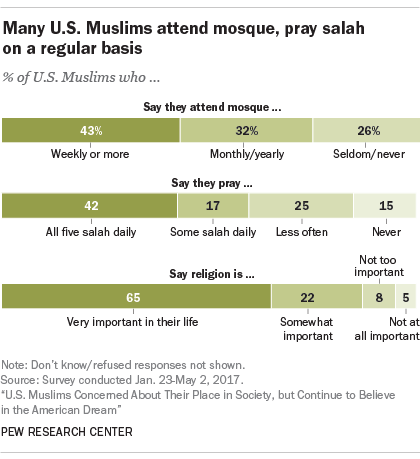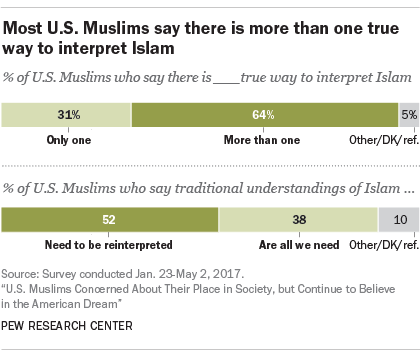

For American Muslims, being highly religious does not necessarily translate into acceptance of traditional notions of Islam. While many U.S. Muslims say they attend mosque and pray regularly, sizable shares also say that there is more than one way to interpret their religion and that traditional understandings of Islam need to be reinterpreted to address the issues of today.

By some conventional measures, U.S. Muslims are as religious as – or more religious than – many Americans who belong to other faith groups. Four-in-ten (43%) Muslim Americans say they attend mosque at least once a week, including 18% who say they attend more than once a week, according to a 2017 Pew Research Center survey. An additional 32% say they attend once or twice a month, or a few times a year. These attendance levels are comparable to those of U.S. Christians, 47% of whom say they attend services weekly or more, and greater than the 14% of American Jews who say the same.
A majority also say that they pray at least some or all of the salah, or ritual prayers required of Muslims five times per day. Among all U.S. Muslims, fully 42% say they pray all five salah daily, while 17% pray at least some of the salah every day. A quarter say they pray less often, and just 15% say they never pray.
And nearly two-thirds of U.S. Muslims (65%) say that religion is very important in their lives, similar to the share of U.S. Christians who say the same (68%), and higher than the share of U.S. Jews who say this (31%). An additional 22% of Muslims say that religion is somewhat important in their lives, while fewer say that religion is not too or not at all important to them.

At the same time, American Muslims openly acknowledge that there is room for multiple interpretations of the teachings of Islam. A majority (64%) say there is more than one true way to interpret the faith’s teachings, while just half as many (31%) say there is only one true way to interpret Islam. And it’s not just less-religious Muslims who express this sentiment: While 72% of Muslims who say religion is somewhat (or less) important in their life say they are open to multiple interpretations, a majority (59%) of those who say religion is very important in their life also say there is more than one true way to interpret the faith. Among U.S. Christians, there is a similar balance: 60% say there is more than one true way to interpret the teachings of their religion, while 34% say there is just one true way.
About half (52%) of all U.S. Muslim adults also say that traditional understandings of Islam must be reinterpreted to reflect contemporary issues, while 38% maintain that traditional understandings of Islam are all that are needed to address today’s issues. On this question there is more of a difference of opinion among Muslims when it comes to how important religion is in their lives. Those who say religion is very important in their lives are evenly divided (43% say traditional understandings should be reinterpreted vs. 46% who say traditional understandings are all that is needed), while about seven-in-ten (71%) of those who say religion is less important express the view that Islamic teachings need to be reinterpreted.
